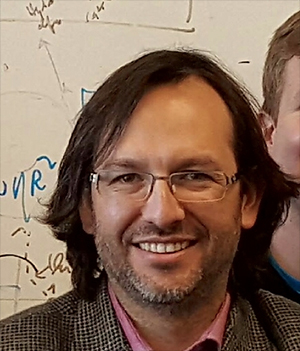
Alfredo Alexander-Katz
(he/him)
Materials Science and Engineering
Fortifying students
Stressful transitions are endemic to graduate school. Professor Alfredo Alexander-Katz is a reliable resource for students, helping them to endure and even thrive amidst difficulty.
Alexander-Katz is an associate professor in MIT’s Department of Materials Science and Engineering, where he leads the Laboratory for Soft Materials. The lab focuses on self-assembly and the dynamics of biological soft materials using a combination of analytical theory, simulations, and experiments. In particular, the lab is working to design three dimensional self-assembled materials and new polymers for applications in energy and biological systems.
Physical distancing, social connectedness
When students are facing challenges, Alexander-Katz is understanding and generous with his time. In one instance, he worked weekly with a group of students who needed to retake their qualifying exams, helping them build confidence, solidify concepts, and improve their public speaking skills.
In their nomination letter, a student mentions a harrowing period in their life, as their mother went through terminal cancer. Alexander-Katz was incredibly supportive throughout this time and helped ensure the student could smoothly navigate graduate school while being based with their mother. His active empathy for students aligns with a Mentoring Guidepost identified by the Committed to Caring program.
New group members have joined in the midst of the pandemic; they feel both included and encouraged by Alexander-Katz and other labmates. Writes one advisee, “I work remotely all the time but I feel I belong to the group” which is “very supportive, friendly, and willing to help each other.” Alexander-Katz writes that what fulfills him is seeing his students succeed.
Compassionate advocacy
The pandemic has taken a significant toll on many students. When one student had a Covid-19 scare, Alexander-Katz “was constantly checking in… offering to drop off food if needed, and encouraging [the student] to relax and not worry” about work, acknowledging the stress of waiting on a test. This encouragement and support bolstered the student and helped ease their fear and uncertainty. Fortunately, the test was negative.
Alexander-Katz advocates for students at times when they are not fully able to advocate for themselves. His advisees emphasize how comfortable they are talking openly about their mental health with him. Writes one advisee, “During the past year in particular, [Alexander-Katz] has even gently and compassionately pointed out that I seem more stressed… and it has helped me get support.”
Above all, Alexander-Katz prioritizes the wellbeing of his students. Daily, writes one nominator, he “encourages us to get enough rest, exercise, and healthy [meals] to be productive at our jobs and happy in our lives.”
